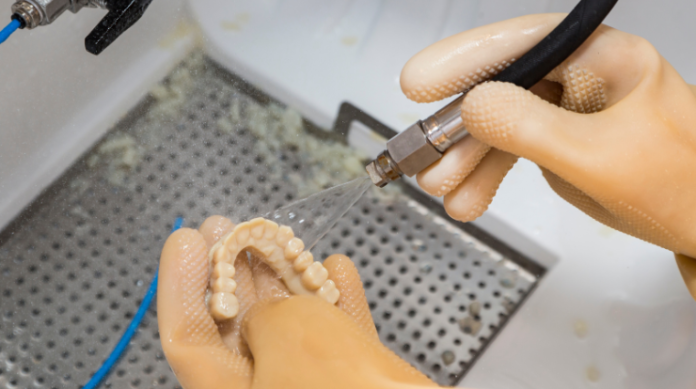Dental implants are a widely recognized and effective solution for tooth replacement in Dubai, offering both functional and aesthetic benefits. The advent of 3D printing technology has revolutionized the production of dental implants, allowing for more customization and precision than ever before.
A critical aspect of 3D printing dental implants is the choice of materials. In this comprehensive guide, we will explore the materials commonly used in 3D printing dental implants in Dubai, their characteristics, biocompatibility, and the factors influencing material selection.
The Significance of Choosing the Right Material
Material Selection Defined
Material selection in the context of 3D printing dental implants refers to choosing the type of substance that will be used to create the implant. The material should be biocompatible, durable, and suitable for the 3D printing Dubai process.
Impact on Implant Characteristics
The choice of material directly affects the characteristics of the dental implant. These characteristics include strength, durability, aesthetics, biocompatibility, and cost. Each material has its unique properties, making it crucial to select the most suitable one based on individual patient needs and clinical requirements.
Common Materials Used in 3D Printing Dental Implants in Dubai
1. Titanium Alloys
Characteristics: Titanium alloys are known for their exceptional strength and corrosion resistance. They are biocompatible and widely used in dental implantology worldwide, including in Dubai.
Biocompatibility: Titanium is highly biocompatible and has been used in medical and dental applications for many years. It integrates well with bone tissue.
Aesthetics: Titanium implants are typically not used for highly visible areas, as their metallic color may show through the gums.
Durability: Titanium is renowned for its durability and long-term performance, making it a preferred choice for dental implants.
2. Zirconia
Characteristics: Zirconia is a ceramic material that is highly aesthetic and biocompatible. It is known for its natural tooth-like appearance.
Biocompatibility: Zirconia is biocompatible and is well-tolerated by the human body. It integrates with bone tissue, promoting long-term stability.
Aesthetics: Zirconia is prized for its natural white color, making it an excellent choice for dental implants in visible areas of the mouth.
Durability: Zirconia implants are strong and durable, providing long-lasting results.
3. PEEK (Polyetheretherketone)
Characteristics: PEEK is a high-performance polymer that is lightweight and has excellent mechanical properties.
Biocompatibility: PEEK is biocompatible and is used in various medical applications, including dental implantology.
Aesthetics: PEEK implants are tooth-colored, making them a suitable choice for aesthetic considerations.
Durability: PEEK implants offer good mechanical strength, and they are resistant to wear and tear.
4. Cobalt-Chromium Alloys*
Characteristics: Cobalt-chromium alloys are known for their strength and resistance to corrosion.
Biocompatibility: These alloys are biocompatible but are typically used for temporary or removable dental prostheses, rather than for permanent implants.
Aesthetics: Cobalt-chromium alloys are not as aesthetically pleasing as titanium, zirconia, or PEEK.
Durability: They offer excellent mechanical strength and are used for specific dental implant applications.
Factors Influencing Material Selection in Dubai
Patient Specifics
The specific needs and circumstances of the patient in Dubai play a significant role in material selection. Factors such as the location of the missing tooth, bone quality, and the patient’s oral health are considered when choosing the right material.
Aesthetic Considerations
In Dubai, where aesthetics are highly valued, the appearance of dental implants is a crucial consideration. Materials like zirconia and PEEK, which closely mimic natural teeth, are often preferred for visible areas of the mouth.
Cost Implications
The cost of the material can also influence the selection. While materials like titanium are cost-effective and widely used, zirconia tends to be more expensive due to its aesthetic advantages.
Biocompatibility and Safety
Ensuring that the chosen material is biocompatible and safe for the patient is a primary concern for dental professionals in Dubai. The material must not trigger allergic reactions or adverse tissue responses.
Conclusion
The choice of materials for 3D printing dental implants in Dubai is a critical decision, as it directly impacts the characteristics and performance of the implant. Dental professionals carefully consider factors like biocompatibility, aesthetics, durability, and cost to select the most suitable material for each patient’s unique needs.
Whether it’s the strength of titanium, the aesthetics of zirconia, the lightweight nature of PEEK, or the specific applications of cobalt-chromium alloys, the goal is to ensure that dental implants in Dubai offer the highest level of patient satisfaction, aesthetics, and functionality. As 3D printing technology continues to advance, more materials may emerge, offering even greater options for dental implant production in Dubai.


